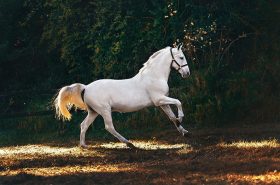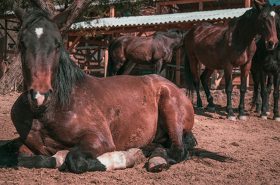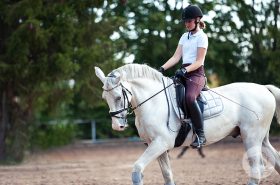One of the best habits I formed early in my years of horse keeping was writing daily notes about my horses in a journal. If my horses were ever acting “off”, I could go back through my notes to find clues about what might be the cause. Now with a fresh new year (a new decade even!), starting a horse keeping journal may be a good practice to adopt. Here are some things you can keep track of in a horse keeping journal.
Body Weight Changes
Your horse’s body weight usually fluctuates throughout the year with the ebb and flow of the seasons. Keeping notes about these subtle changes can help you better track these details. Sometimes we don’t notice these subtle changes when we look at our horses every day. Taking conformation photos on a regular basis is another great way to monitor how your horse looks throughout the year.

Feed, Supplements, and Water Intake
Keeping track of your horse’s daily feed, supplements, and water intake throughout the year is another way to monitor the health of your horse. Note when a new delivery of hay comes in so you can monitor how your horse reacts to it while they acclimate. You can also note here any changes in how your horse is chewing, if they are dropping any grain, or showing any signs of discomfort with chewing. This is great information to provide your equine dentist during teeth floating. Note your horse’s daily water intake to determine their baseline average so you can quickly notice if they have increased or decreased their water intake and investigate possible causes.
Turnout Schedule
Taking notes about your horse’s turnout schedule can provide many clues about your horse. You can be as specific as possible here. Write down what time of day they went out, what the weather was like that day, which pasture they were in, pasture conditions, who they were turned out with, and how they acted when they came in. If you have your horses at home, all these details are easily noted yourself. If your horses are boarded, make a plan with the barn staff that may handle turn out for you to keep you updated on these kinds of details. If your horse comes up lame, you may be able to look through your notes and see that 3 days ago he ran around the muddy pasture with a new pasture mate so maybe he is a little sore from that extra activity. Even if your horses live out in the pasture, you can still make notations about their daily activity while out.
Weather
I like to keep track of changes in the weather since it definitely affects my horses who live outside with free-choice access to shelter. Our weather in Ohio can change drastically over the course of a day. Prolonged wet weather means my horses are limited to their gravel dry lot so they aren’t moving around as much as when they have access to the whole pasture. This reduction of activity may cause stocking up in their hind legs or make them act more cranky with each other. If I know it’s just because they are confined to a smaller area and moving less, then I know it’s nothing to worry about. If those symptoms showed up another time, it could be a reason to worry. Sudden temperature changes can even possibly cause colic or other upset. If you blanket your horses, tracking weather conditions and what blankets they wore during those times can help you plan ahead for blanketing changes.
Training and Tack Changes
You can easily make a separate journal to track your training with your horses if you are committed to accomplishing big training or competitive goals. You can also just make a section in your daily journal entries to note what you did that day, how long you warmed up and cooled down, what exercises your horse did well with and what they struggled with. Include here any additional preparations leading up to competitions and then a summary of the competition day. Note any tack changes so you can trace differences in your horses from different bits, saddles, saddle pads, or other equipment.
Details Matter
You may be thinking, “I already keep track of all this in my head, why do I need to write it in a horse keeping journal?”. It is so easy to forget little details about when the new hay was delivered when your horse slipped and fell in the pasture, and when you started using your new saddle pad. These may seem unimportant, but they can provide so many clues to the health and happiness of our horses! Many times over the years I have had to look back through my notes to pinpoint possible causes for changes in body weight, behavior, or soundness. It is a simple practice and an easy habit to develop that will serve you and your horses well.
Do you write in a horse keeping journal? What things do you take note of in your entries?
**
Jen and her husband, Clayton, bought their farm in August of 2018 and love living the simple country life. They share their home and farm with their dogs, cats, horses, and chickens. Jen loves learning and is always researching new things for the farm, house, animals, and natural wellness. Her favorite mantra is “thoughts are things” and hopes to inspire and empower people to create abundance and sustainability in their own lives. Follow Jen on Instagram @steelspoonfarm and read her blog at www.steelspoonfarm.com




